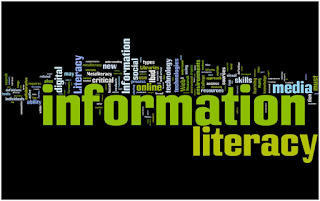Library Instruction, Discovery Layers, and that Old Black Dude in Front of the White Board
Starting next Tuesday, I teach library instruction sessions for my university's Writing and Rhetoric 160 classes. WRT 160 is the second half of the university's basic writing requirement. It is a fundamental research class. Students learn to build upon credible, authoritative information to create new knowledge. I am responsible for 28 out of approximately 100 such classes. More than any other librarian. When I initially saw my schedule, I thought I was being punished for being so "outspoken" in this blog. Then I thought about it. I love the terror of standing before 20-24 disenchanted first year students. I love the challenge of creating conversations that may impact their academic careers. I like to think that I may even affect some students' post-university careers. I love this particular stage, even if I am the only African American male on it.
I usually start my classes with a simple question: how do we know what we know? I follow with specific epistemological tools and techniques that enable us to know the world. We know what we know because we read. We know what we know because we observe. We know what we know because others have taught and tested us. But often we know what we know through conversations. As we listen to the various conversations, our brains make connections between different ideas and concepts. Often these connections play out in our dreams.
At my institution, library instruction classes are basically database search strategies. We teach students how to effectively use Library OneSearch, a very expensive discovery layer that somewhat mimics Google. Students type in a few keywords and get a plethora of "relevant" sources. Often they get full-text links. I think this tool is very important. But I think it is more essential that students learn to make connections among apparently unrelated phenomena. I think it is crucial that students replicate in the classroom what they do every day: connect apparently contradictory, unrelated data and reach conclusions based on those connections. I try to teach to students to be creative, to mimic their processes of their dreams.
I often ask myself why I teach library instruction this way and not the usual "guide through a very expensive discovery layer" method. Because I am an African American male librarian, I think I need to demonstrate that I am capable of innovation in librarianship. I feel like I must prove that I am an intellectual being who has earned a place in this profession. I feel that I must do more than simply curate the information infrastructure.
I often claim that I am a marginal figure. A Black man whose very body, whose very presence in the library seems to unravel its largely white, middle-class female culture. Even in the best situations, I often feel that I am the "exotic other" who is merely tolerated, not embraced. But as I often say, a lot can be done in the margins.
I usually start my classes with a simple question: how do we know what we know? I follow with specific epistemological tools and techniques that enable us to know the world. We know what we know because we read. We know what we know because we observe. We know what we know because others have taught and tested us. But often we know what we know through conversations. As we listen to the various conversations, our brains make connections between different ideas and concepts. Often these connections play out in our dreams.
At my institution, library instruction classes are basically database search strategies. We teach students how to effectively use Library OneSearch, a very expensive discovery layer that somewhat mimics Google. Students type in a few keywords and get a plethora of "relevant" sources. Often they get full-text links. I think this tool is very important. But I think it is more essential that students learn to make connections among apparently unrelated phenomena. I think it is crucial that students replicate in the classroom what they do every day: connect apparently contradictory, unrelated data and reach conclusions based on those connections. I try to teach to students to be creative, to mimic their processes of their dreams.
I often ask myself why I teach library instruction this way and not the usual "guide through a very expensive discovery layer" method. Because I am an African American male librarian, I think I need to demonstrate that I am capable of innovation in librarianship. I feel like I must prove that I am an intellectual being who has earned a place in this profession. I feel that I must do more than simply curate the information infrastructure.
I often claim that I am a marginal figure. A Black man whose very body, whose very presence in the library seems to unravel its largely white, middle-class female culture. Even in the best situations, I often feel that I am the "exotic other" who is merely tolerated, not embraced. But as I often say, a lot can be done in the margins.


Comments
Post a Comment